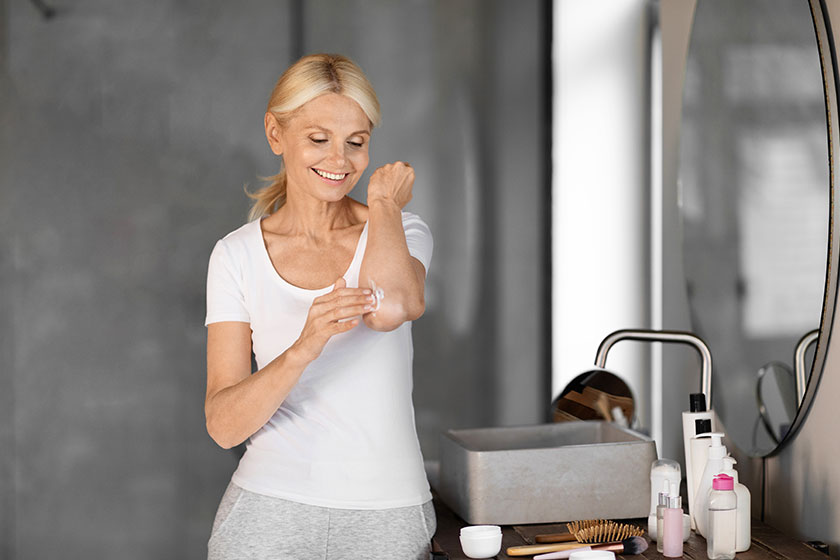One common problem faced by scores of retired individuals is that of dry skin in seniors. But what can you do? As we age, our skin undergoes changes that can lead to dryness, flakiness and discomfort. Retirement age people, in particular, may experience heightened susceptibility to dry skin due to things like decreased oil production, thinner skin and reduced hydration levels. Fortunately, there are several proactive measures you can take to prevent dry skin and maintain a hydrated and healthy complexion well into your 60s and beyond.
Treating Dry Skin in Seniors by Hydrating from Within
Proper hydration is imperative for maintaining healthy skin at any age, but it becomes especially so as we grow older. Retirees should drink an adequate amount of water each day to support skin hydration from within. Also, consuming foods rich in essential fatty acids (think salmon, avocado and nuts) can help nourish the skin and increase moisture retention.
Gentle Cleansing Practices
When it comes to cleansing the skin, gentleness is the key, especially for those prone to dryness. Go with mild, fragrance-free cleansers that won’t strip the skin of its natural oils. Avoid hot water, which can further dehydrate the skin, and instead, use lukewarm water for washing. Pat the skin dry with a soft towel after cleansing, rather than rubbing, to minimize irritation and preserve moisture.
Moisturizing Daily Can Help Combat Dry Skin
Regular moisturization is recommended for preventing dry skin in seniors. Choose a rich, emollient moisturizer formulated specifically for mature skin and apply it liberally after bathing or showering while the skin is still damp.
Pay extra attention to areas prone to dryness, like your elbows, knees and hands. For added hydration, consider incorporating a hydrating serum or facial oil into your skincare routine.
Protecting Against the Elements
External factors like cold weather, wind and sun exposure can exacerbate dryness and compromise skin health. 55+ adults should take steps to protect their skin from the elements by wearing protective clothing, including hats and long sleeves when joining outdoor activities and events. Use a broad-spectrum sunscreen with a minimum SPF of 30 to help prevent sun damage and maintain skin moisture.
Humidifying the Environment
Indoor environments, especially those with central heating or air conditioning, can contribute to dry skin in seniors. Investing in a humidifier can help add moisture to the air, which can in turn benefit the skin. Place humidifiers in commonly used areas of the house, such as the bedroom and living room, to promote a more comfortable and hydrated environment.
Avoiding Harsh Ingredients
Certain skincare products and ingredients can worsen dryness and irritation. Avoid products containing alcohol, fragrances and harsh chemicals, because these can strip the skin of its natural oils and increase dryness. Instead, choose gentle, fragrance-free formulations that are specifically designed for sensitive or mature skin.
Getting Professional Care
In some cases, persistent dry skin may require the expertise of a dermatologist or skincare specialist. Those experiencing severe dryness, itching or skin conditions such as eczema or psoriasis should get professional care for diagnosis and treatment. A dermatologist can recommend targeted skincare products and treatments to address specific skin concerns and promote overall skin health.
The Health Benefits of Assisted Living Bring Peace of Mind for Your Family
Curious about the advantages of a healthy environment through a suitable senior living option for your loved one? Find the peace of mind that comes with knowing your family member is well cared for in a supportive and nurturing environment – including assistance with proper skin care.
Contact us today at 423-744 to learn more about how assisted living can provide security, comfort and peace of mind for both residents and their families.







